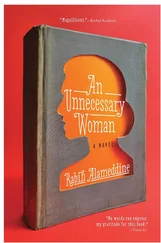A Syrian laborer walked by, trying to steer clear of the puddles under his feet, and his eyes avoided mine. February 2003, more than twelve years since the civil war ended, yet construction still lagged in the neighborhood. Most of Beirut had been rebuilt, but this plot remained damaged and decrepit.
There was Mary in a lockbox.
A windowed box stood at the front of our building, locked in its own separate altar of cement and brick, topped with A-shaped slabs of Italian marble, a Catholic Joseph Cornell. Inside stood a benevolent Mary, a questioning St. Anthony, a coral rosary, three finger candles, stray dahlia and rose petals, and a picture of Santa Claus pushpinned to a white foam backboard.
When did this peculiarity spring to life? Was the Virgin there when I was a boy?
I shouldn’t have come here. I was supposed to pick Fatima up before going to the hospital to see my father but found myself driving to the old neighborhood as if I were in a toy truck being pulled by a willful child. I had planned this trip to Beirut to spend Eid al-Adha with my family and was shocked to find out that my father was hospitalized. Yet I wasn’t with family, but standing distracted and bewildered before my old home, dwelling in the past.
A young woman in tight jeans and a skimpy white sweater walked out of our building. She carried notebooks and a textbook. I wanted to ask her which floor she and her family lived on. Obviously not the second; a fig tree had taken root on that one. That must have been Uncle Halim’s apartment.
The family, my father and his siblings, owned the building and had lived in five of its twelve apartments. My aunt Samia and her family lived in the sixth-floor penthouse. My father had one of the fourth-floor flats, and Uncle Jihad had the other. An apartment on the fifth belonged to Uncle Wajih, and Uncle Halim had one on the second floor — fig tree, I presumed. The apartment on the ground floor belonged to the concierge, whose son Elie became a militia leader as a teenager and killed quite a few people during the civil war.
Our car dealership, al-Kharrat Corporation, the family fountain of fortune, was walking distance from the building, on the main street. The Lebanese lacked a sense of irony. No one paid attention to the little things. No one thought it strange that a car dealership, and the family that ran it, had a name that meant “exaggerator,” “teller of tall tales,” “liar.”
The girl strolled past, indifferently, seductively, her eyes hidden by cheap sunglasses. The old man sat up when the girl passed him. “Don’t you think your pants are too tight?” he asked.
“Kiss my ass, Uncle,” she replied.
He leaned forward. She kept going. “No one listens anymore,” he said quietly.
I couldn’t tell you when last I had seen the neighborhood, but I could pinpoint the last day we lived there, because we left in a flurry of bedlam, all atop each other, and that day my father proved to be a hero of sorts. February 1977, and the war that had been going on for almost two years had finally reached our neighborhood. Earlier, during those violent twenty-one months, the building’s underground garage, like its counterparts across the city, proved to be a more than adequate shelter. But then militias had begun to set up camp much too close. The family, those of us who hadn’t left already, had to find safety in the mountains.
My mother, who always took charge in emergencies, divided us into four cars: I was in her car, my sister in my father’s, Uncle Halim and two of his daughters with Uncle Jihad, and Uncle Halim’s wife, Aunt Nazek, drove her car with her third daughter, May. The belongings of three households were shoved into the cars. We drove separately, five minutes apart, so that we wouldn’t be in a convoy and get annihilated by a stray missile or an intentional bomb. The regathering point was a church just ten minutes up the mountain from Beirut.
My mother and I reached it first. Even though I’d gotten somewhat inured to the sounds of shelling, by the time we stopped my seat was sopping. Within a few minutes, as if announcing Uncle Jihad’s arrival, Beirut exploded into a raging cacophony once more. We watched the insanity below us and waited warily for the other two cars. My mother was strangling the steering wheel. My father arrived next, and since he was supposed to be the last to leave, it meant that Aunt Nazek didn’t make it somehow.
My father didn’t get out of his car, didn’t talk to us. He kicked my sister out, turned the car around, and drove downhill into the lunacy. Aghast and eyes ablaze, my sister stood on the curb, watched him disappear into the fires of Beirut. My mother wanted to follow him, but I was in her car. She yelled at me: “Get out. I need to go after him. I’m the better driver.” I was too paralyzed to move. Then my sister got into the car next to me, and it was too late to follow.
We were lucky. Aunt Nazek’s car had died as soon as it hit the first hill. Always a good citizen, she parked the car on the side, even though there were no other cars on the road. My father had driven past on the way up and hadn’t noticed. He found them, and my cousin May jumped into his car, but he had to wait for Aunt Nazek as she tried to remember where she had put all her valuables. He returned them to us safely, but while he was driving back, a bomb fell about fifty meters away from them, and a piece of shrapnel hit the car’s windshield and got stuck there. No one was hurt, though both Aunt Nazek and May lost their voices for a while, having shrieked their throats dry.
My cousin May said that my father shrieked as well when the shrapnel hit, an operatic high note. However, both my father and Aunt Nazek deny that. “He was a hero,” my aunt would say. “A real-life hero.”
“It wasn’t heroic,” my father would say, “but cowardly. I’d have been too afraid to show my face to my brother if I hadn’t gone back after his wife.”
That day was twenty-six years ago.
Fatima was waiting outside her building, which was covered head to toe in black marble, one of the newer effronteries that have risen in modern Beirut. As if to compensate for the few neighborhoods that had not been upgraded since the war, Beirut dressed itself in new concrete. All over the city, upscale high-rises were being built in every corner, nouveau-riche and bétonné.
“Sorry I’m late,” I said, grinning. I could usually predict her reaction, since she was an old friend and confidante. I was about to get a pretend tongue-lashing no matter what I said.
“Get out of the goddamn car.” She didn’t move to the passenger side, stood with arms akimbo, her blue-green purse dangling from her wrist almost to her knees. She was dressed to dazzle; everything about her flashed, and the ring on her left hand screamed — a hexagonal mother of an emerald surrounded by her six offspring. “You haven’t seen me in four months, and this is how you greet me?” I got out of the car, and she smothered me, covered me in her perfume and kisses. “Much better,” she added. “Now let’s get going.”
At the first sign of traffic, she slid open the visor mirror and interviewed her face. “You have to help me with Lina.” Her words sounded odd, her mouth distorted as she redecorated her lips’ outline. “She’s spending the nights sleeping on the chair in his room. As ever, your sister won’t listen to reason. I want to relieve her, but she won’t let me.”
I didn’t reply, and I doubted that she expected me to. Both of us understood that my father wouldn’t allow anyone other than my sister to take care of him and was terrified of spending a night by himself. He had nightmares about dying alone and uncared for in a hospital room.
“When we arrive,” she said, “kiss everybody and go directly to his room. I don’t think there will be a lot of people, but don’t allow the rest of the family to delay you. I’ll stay with the visitors, not you. He’ll be offended if you don’t rush in to see him.”
Читать дальше












